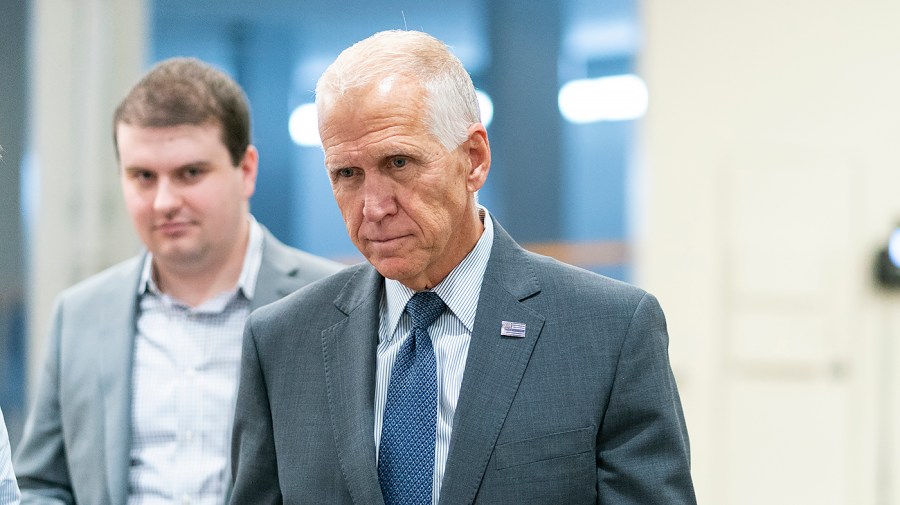Senate GOP frustration grows after quick exits of key Trump officials

Senate Republicans are growing increasingly frustrated after a series of President Trump’s nominees tapped to key posts have been ousted or have left after only a short stint in office, leaving lawmakers scratching their heads after they poured considerable time and effort into their confirmations.
At least five such people have departed for various reasons, but a majority have left after dust-ups with key administration officials. Former Centers for Disease Control and Prevention (CDC) Director Susan Monarez and ex-IRS Commissioner Billy Long serve as prime examples.
This is grating on GOP members, who have complained loudly about having to use the full Senate clock to confirm nominees because of a Democratic blockade and would prefer to not waste their time only to see a confirmed figure go belly up in short order.
“It reminds me of Spinal Tap concerts. … It’s like every time we turn around, somebody’s blowing up,” Sen. Thom Tillis (R-N.C.) said. “It’s just not a very efficient use of resources.”
The problem came increasingly into view over the past few weeks after Monarez, who was confirmed days before the Senate departed for the monthlong August recess, was ousted from her post atop the CDC after she ran afoul of Health and Human Services Secretary Robert F. Kennedy Jr.
Monarez wrote in an op-ed ahead of Kennedy’s tense appearance before the Senate Finance Committee this past week that she was removed after refusing to “preapprove the recommendations of a vaccine advisory panel newly filled with people who have publicly expressed antivaccine rhetoric.”
Her tenure did not last a month, and she was fired before the Senate could even return after Labor Day, something Tillis referenced to Kennedy during the hearing.
“How do you [make this decision] in 20 business days? Really?” Tillis told The Hill. “That you found out something about her you couldn’t have known 25 business days ago so we didn’t waste the time. We could have spent it on something more productive and enduring.”
Senate Majority Leader John Thune (R-S.D.) also sounded off at Kennedy’s quick trigger.
“He’s got to take responsibility for, you know: We confirm these people. We go through a lot of work to get them confirmed. And they’re in office a month?” Thune told reporters last week.
Less than three weeks before Monarez’s exit, Long, a former Missouri congressman, was removed by Trump as IRS commissioner after reportedly clashing with Treasury Secretary Scott Bessent. Long’s tenure didn’t hit the two-month mark, having been confirmed in mid-June before his early August removal.
Bessent is in charge of the IRS while the search for a new nominee to lead the tax collecting agency continues. Long was nominated to become ambassador to Iceland.
The Treasury Department was also affected when Michael Faulkender was excised from his post as deputy secretary and Bessent’s No. 2 less than five months after receiving the Senate’s green light.
According to The Wall Street Journal, Trump soured on Faulkender and came to believe he was not aligned with his overall vision. Faulkender, who served as assistant secretary of the Treasury Department for economic policy during Trump’s first term, was tasked with running the department’s day-to-day operations this go-around.
“I worry that … with the churning in personnel, it makes things more challenging for the Trump administration,” Sen. John Cornyn (R-Texas) said about the quick ouster of the nominees. “If you don’t have any stability in these positions, that seems to me to be a challenge.”
“Again, the president’s got the right to pick his team, and I support that,” he added.
On top of the trio, at least two other nominees went through the confirmation process only to either get yanked at the last minute or get the OK from the upper chamber and leave on their own months later.
Jared Isaacman falls into the first bucket, having had his nomination to lead NASA pulled on May 31 as he was knee deep in the Senate confirmation process
Isaacman was purportedly removed due to contributions to Democrats in recent years, but the timing coincided with the end of Elon Musk’s tenure at the White House as a special government employee. The two are close allies.
The withdrawal of his nomination also came days before he was set to be confirmed by senators. He had already been approved by the Senate Commerce, Science and Transportation Committee with bipartisan support.
There was also swift turnover at the Department of Justice (DOJ) in a key post. Aaron Reitz, Sen. Ted Cruz’s (R-Texas) former chief of staff, was confirmed in March to a top DOJ job along partisan lines, but he departed in mid-June. One day later, he announced his much-rumored bid to become the next attorney general of Texas.
“They have been noticed,” one Senate GOP aide said about the string of swift firings and departures.
The vacancies come amid a high-stakes backdrop in the upper chamber as Republicans have cried foul at the ongoing Democratic blockade, which has prevented any Trump nominees from being confirmed via voice vote or unanimous consent — a major sea change from past Senate business.
Republicans are widely expected to change the rules in the next two weeks to allow them to confirm scores of Trump’s nominees awaiting floor consideration en bloc.
However, the logjam has forced Republicans to run the clock in full for all the previous nominees, and not all nominees will be eligible for en bloc consideration.
“It happens from time to time,” said Sen. Shelley Moore Capito (W.Va.), a member of GOP leadership, adding that it’s nothing “unusual.” “But it would be nicer to have these dust-ups before we did burn the time.”
Republicans also concede that there is little they can control once an official is confirmed.
“There’s not much I can do about it,” Thune added to The Hill.